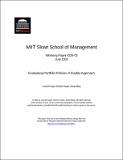| dc.contributor.author | Kogan, Leonid | |
| dc.contributor.author | Haugh, Martin | |
| dc.contributor.author | Wang, Jiang | |
| dc.date.accessioned | 2003-08-15T20:19:05Z | |
| dc.date.available | 2003-08-15T20:19:05Z | |
| dc.date.issued | 2003-08-15T20:19:05Z | |
| dc.identifier.uri | http://hdl.handle.net/1721.1/3540 | |
| dc.description.abstract | The performance of a given portfolio policy can in principle be evaluated by comparing
its expected utility with that of the optimal policy. Unfortunately, the optimal policy is
usually not computable in which case a direct comparison is impossible. In this paper
we solve this problem by using the given portfolio policy to construct an upper bound
on the unknown maximum expected utility. This construction is based on a dual
formulation of the portfolio optimization problem. When the upper bound is close to
the expected utility achieved by the given portfolio policy, the potential utility loss of
this policy is guaranteed to be small. Our algorithm can be used to evaluate portfolio
policies in models with incomplete markets and position constraints. We illustrate our
methodology by analyzing the static and myopic policies in markets with return
predictability and constraints on short sales and borrowin | en |
| dc.format.extent | 223960 bytes | |
| dc.format.mimetype | application/pdf | |
| dc.language.iso | en_US | |
| dc.relation.ispartofseries | MIT Sloan School of Management Working Paper;4329-03 | |
| dc.subject | Portfolio Choice | en |
| dc.subject | Duality | en |
| dc.subject | Dynamic Programming | en |
| dc.subject | Constraints | en |
| dc.subject | Monte Carlo | en |
| dc.subject | Simulation | en |
| dc.title | Evaluating Portfolio Policies: A Duality Approach | en |
| dc.type | Working Paper | en |

